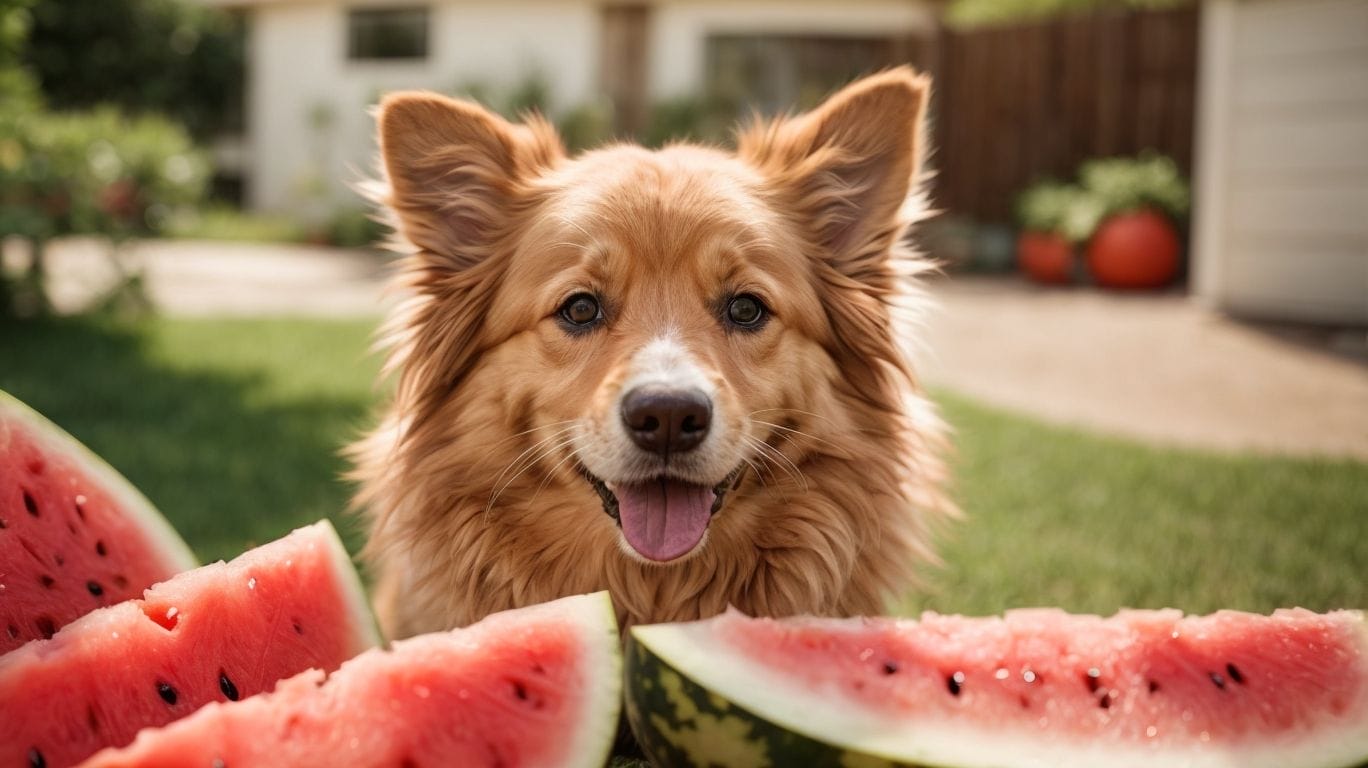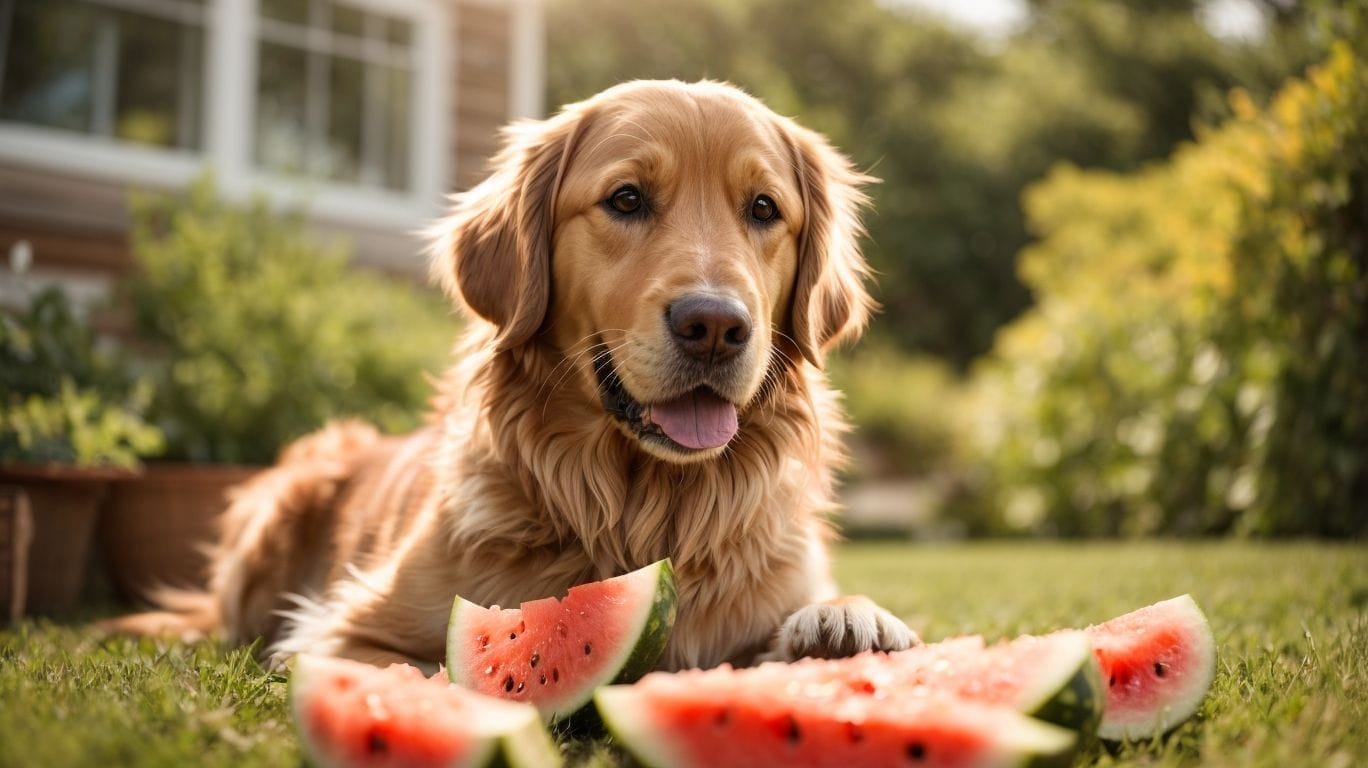Can Dogs Eat Watermelon? That’s a question many dog owners have. While it’s tempting to share your favorite fruits with your furry friend, it’s important to know which ones are safe for them. Specifically, can dogs safely consume watermelon? Let’s dive into the topic to find out.
Watermelon can provide potential benefits for dogs, such as hydration, a source of vitamins and antioxidants, and a low-calorie treatment option. However, there are also potential risks to consider, such as the presence of seeds or rind that can pose a choking hazard or cause gastrointestinal issues.
To safely feed watermelon to your dog, it’s important to follow a few guidelines. This includes preparing the watermelon by removing seeds and rind, serving an appropriate portion size, and monitoring for any adverse reactions.
If your dog cannot consume watermelon or you’re looking for alternatives, some other fruits and foods are safe for dogs to eat. Understanding the options and knowing the proper way to introduce these foods can help diversify your dog’s diet safely and healthily.
By understanding the potential benefits, risks, and guidelines for feeding watermelon to dogs, you can make an informed decision and ensure your furry friend stays safe and happy while enjoying their treats.
Key takeaways:
- Watermelon is safe for dogs to eat in moderation: Watermelon can be a refreshing and hydrating treat for dogs, but it should be given in small amounts to prevent digestive issues.
- Benefits of dogs eating Watermelon: Watermelon is low in calories and fat, and it contains vitamins A, C, and B6, as well as fiber and lycopene, which can contribute to a dog’s overall health.
- Risks to be aware of: Although rare, some dogs may have difficulty digesting watermelon or may experience an upset stomach. Additionally, the seeds and rind of the watermelon should be removed, as they can pose a choking hazard or cause intestinal blockages.
Can Dogs Safely Consume Watermelon?

Photo Credits: Petnarnia.Com by Lawrence Lopez
Can dogs safely consume watermelon?
Watermelon can be a safe and healthy treat for dogs when given in moderation. It is important to remove the seeds and rind to prevent choking or digestive issues. Watermelon is mostly composed of water and contains essential vitamins and minerals. Can dogs safely consume watermelon? It can help hydrate dogs during the hot summer months. Some dogs may have difficulty digesting watermelon, leading to diarrhea or stomach upset. It is best to introduce watermelon gradually and monitor your dog’s reaction. If you have any concerns, consult with your veterinarian before feeding watermelon to your dog. Remember, moderation is key when offering any new food to your furry friend.
What are the Potential Benefits of Dogs Eating Watermelon?
What are the Potential Benefits of Dogs Eating Watermelon?
Feeding watermelon to dogs can have several potential benefits, including hydration, vitamins, and fiber.
- Hydration: Watermelon is composed mostly of water, which can help keep dogs hydrated, especially during hot summer months.
- Vitamins: Watermelon is a good source of vitamins A and C, which are essential for a dog’s immune system and overall health.
- Fiber: The fruit’s fiber content can aid in digestion and help prevent constipation in dogs.
Pro-tip: While watermelon can be a healthy treat for dogs, always remove the seeds and rind before feeding it to them.
What are the Potential Risks of Dogs Eating Watermelon?
When it comes to dogs eating watermelon, it’s important to consider the potential risks. What are the potential risks of dogs eating watermelon? First, the seeds can present a choking hazard or cause intestinal blockage if swallowed in large quantities. Second, if consumed excessively, the high sugar content in watermelon can lead to weight gain and obesity in dogs. Some dogs may also have difficulty digesting watermelon, resulting in gastrointestinal upset such as diarrhea or stomach discomfort. Remember to monitor your dog’s intake and consult with a veterinarian if you have any concerns about their ability to consume watermelon safely.
How to Safely Feed Watermelon to Dogs

Photo Credits: Petnarnia.Com by Anthony Nelson
Are you looking to treat your furry friend with a juicy watermelon snack? Discover the safe and paw-some ways to feed watermelon to dogs in this section! We’ll uncover how to prepare watermelon for dogs properly, figure out the ideal serving size and frequency, and learn important tips for monitoring any adverse reactions. So, if you’ve been wondering whether dogs can eat watermelon or how to incorporate it into their diet, you’ve come to the right place! Let’s dive in and ensure a delightful and safe fruity experience for your canine companion.
Preparing Watermelon for Dogs
- When preparing watermelon for dogs, it is important to start by thoroughly washing the watermelon to remove any dirt or pesticide residues.
- Next, carefully remove the rind and seeds from the watermelon. Dogs may have difficulty digesting the rind and seeds, which could lead to gastrointestinal issues.
- Afterward, cut the watermelon into small, bite-sized pieces. This will make it easier for your dog to chew and swallow.
- You have the option to serve the watermelon as is or freeze it for a refreshing treat during the hot summer months.
- While your dog enjoys the watermelon, always monitor them to ensure they are chewing and swallowing properly.
Remember, moderation is key when giving watermelon to dogs. This delicious and nutritious treat should be given in moderation to prevent any stomach upset. Enjoy preparing watermelon for your furry friend, and have fun sharing this hydrating treat with them!
Serving Size and Frequency
When feeding watermelon to dogs, it’s crucial to take into account both the serving size and frequency. This will ensure that your furry companion can enjoy the benefits of watermelon without experiencing any negative effects. Here is a breakdown of the appropriate serving size and frequency for dogs:
| Size of Dog | Serving Size |
|---|---|
| Small (1-20lbs) | 1-2 small cubes |
| Medium (21-50lbs) | 2-4 small cubes |
| Large (51-100lbs) | 4-8 small cubes |
It’s highly recommended to offer watermelon to dogs as an occasional treat rather than a regular component of their diet. Additionally, it’s important to keep a close eye on any adverse reactions such as stomach upset or diarrhea. If you have any concerns or questions regarding feeding watermelon to your dog, make sure to consult with your veterinarian.
Monitoring for any Adverse Reactions
Monitoring for any adverse reactions is crucial when feeding watermelon to dogs. Some dogs may have allergies or sensitivities to certain foods, including watermelon. It is vital to observe your dog after introducing watermelon into their diet. Look out for any signs of gastrointestinal upset, such as vomiting or diarrhea, as well as any allergic reactions like itching or swelling. If you notice any adverse reactions, it is advisable to discontinue feeding watermelon to your dog and seek advice from a veterinarian. Always remember to gradually introduce new foods and monitor your dog’s response to ensure their health and safety.
Other Fruits and Foods Dogs Can Eat

Photo Credits: Petnarnia.Com by Ralph Martin
While watermelon is safe for dogs, it’s important to be aware of other fruits and foods dogs can eat that are also safe for them to consume.
- Apples: Remove seeds and core, then slice into bite-sized pieces.
- Bananas: Rich in potassium, feed in moderation as a treat.
- Blueberries: High in antioxidants, they are offered as a healthy snack.
- Carrots: Crunchy and low in calories, great for dental health.
- Peanut butter: A tasty and protein-rich treat, but avoid varieties containing Xylitol.
Remember, moderation is key, and always consult your veterinarian before introducing new foods into your dog’s diet.
Are There Any Alternatives to Feed Dogs Instead of Watermelon?
Are There Any Alternatives to Feed Dogs Instead of Watermelon?
There are indeed alternatives to feeding dogs instead of watermelon that offer similar nutrients and health benefits. Please consider the following options:
- Apples: They are an excellent source of vitamins A and C, along with fiber. It is important to remember to remove the seeds and core before feeding apples to your dog.
- Blueberries: These small fruits are filled with antioxidants and can be given as a nutritious snack or included in their meals.
- Bananas: With their richness in potassium and fiber, bananas make for a wonderful substitute for watermelon. Just make sure to peel them and feed them in moderation.
- Cucumbers: Cucumbers are low in calories and provide hydration, making them a refreshing option for dogs. It is advisable to slice them into small pieces before serving.
These alternatives offer your dog a diverse range of flavors and nutrients while also ensuring a healthy and balanced diet. It is crucial to introduce any new food gradually and consult with your veterinarian if you have any concerns or questions.
Some Facts About Can Dogs Eat Watermelon:
- ✅ Dogs can eat watermelon, but precautions should be taken. (Source: Our Team)
- ✅ watermelon should be given to dogs without seeds and rind. (Source: Our Team)
- ✅ watermelon is high in sugar, so it should be fed in moderation. (Source: Our Team)
- ✅ watermelon is hydrating for dogs, especially during summer. (Source: Our Team)
- ✅ watermelon is a relatively healthy treat for dogs due to its low-calorie content. (Source: Our Team)


